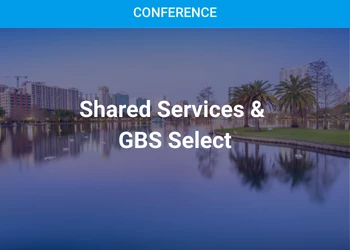SSO Week Lisbon 2018: Business Services – the ‘iPad’ of Administration
Where is the Shared Services model headed?
Add bookmark

While in the past, Shared Services leaders’ objectives tended to reflect some characteristics or other of Global Business Services, the combination of digitalization, robotization, and analytics has redefined the game plan. Yes, the operational model is still a fundamental part of the strategy, but, today, customer experience has moved into first place. Supported by digitization and driven by automation, good old-fashioned "service" has moved back to center stage.
In summarizing the the trends of this year’s Shared Services and Outsourcing Week Europe conference, I've got to start with the end. For if there was one speaker last week in Lisbon, who best summarized what we do, how we do it, and why we do it – it was Guy Mercier, Head of Worldwide Services Strategy and Delivery operations for Solvay Business Services. Guy closed out this four-day event on an inspirational high note, painted a high-tech picture of the future, encouraged delegates to stretch towards it – and is a man lucky enough to call Lisbon home.
Guy launched – and leads – Solvay Business Services, a global Shared Services organization that covers four end-to-end processes (the usual suspects of O2C, P2P, H2R and R2R) and service delivery operations. He leads a team of over 1,300 global employees and supervises four Heads of Region and four SSCs (apart from Lisbon: Riga, Curitiba, and Bangkok). In this capacity, Guy leads the cross-functional strategy and services driving group transformation at Solvay. In his vision, the customer stands firmly in first place (whereby Shared Services need to recognize the difference between the internal customer, and the end user experience). The survival of the Shared Services model will depend on its ability to offer speed and agility, he warns, explaining, "You will live or die based on the accessibility you offer and your speed of delivery." At Solvay, this is supported through a single point of contact, called SPOC, which was introduced to eliminate the "It depends…" answer that so many questions yielded. The user experience is key and it's the single thing that will set you apart in future, says Guy.
See also: European SSON Excellence Award Winners 2018!
Perhaps the most compelling vision of the future, however, is the google-ization that is sweeping the world, Shared Services included. Shared Services will need to target a Google-type business services platform built on robotization and digitalization – both capabilities widely available today – according to Guy’s vision. Along with this, they will need to ensure that customers "pull" the solutions they want towards themselves – right now the model is still predominantly a “push” product. As success breeds success, businesses will start pulling more, however. And just as in our private life we choose the apps we want, when we want them, and trust them to be reliable – business services, too, will have to reflect customers’ expectations and become “the iPad of administration,” Guy says.
It's a dizzying vision, but not an impossible one. All you had to do was stroll through the exhibition hall during the networking breaks and chat with the dozens and dozens of vendors on site to understand that digitization is breaking all frontiers. For those who think the technology is highly complex, Automation Anywhere hosted a "build a bot" 10-minute workshop in the middle of the exhibition hall. I took part, and can attest to the fact that it's not coding as it used to be! But while some of the high profile robotics providers easily caught the eye, every solution provider today has upped their game to keep up with the digital world.
This world is being driven by the talent coming into the business. While it's no longer newsworthy to highlight the impact of Millennials on operations, those who work closest with them have a lot of valuable insights and tips to share with delegates – for example, Stephen Caulfield, Vice President Dell EMC Global Services & GM Dell Bratislava. Millennials’ expectations differ significantly from generations in the past, he tells us. This is most obvious in the initial interview where it soon becomes clear that rather than you interviewing them, Millennials are interviewing you! And while the reality of having to survive may somewhat dampen their aspirations, the truth is that they change jobs easily and want to work for a company whose core values are aligned with theirs. If you don't believe it, just ask Facebook.

Stephen Caulfield, Dell EMC Global Services
In addition, while in the past the issue of "family" was kept hidden, today, Millennials want to know how they can plan for childcare way ahead of time.
Another hugely popular session that offered more individually tailored tips was led by Deborah Kops, based on the results of a survey she ran with SSON last year – a sort of Myers–Briggs for Shared Services – which focused on Shared Services careers. Four key personae emerged from the survey, with delegates easily aligning with either Interpreter, Adapter, Leader or Expert. These personae are characterized by the way they network, wield influence, their tenure, and how they leverage their position within operation. What emerged overall was that Shared Services executives are vastly underestimating the importance of their own brand. And in today's world, your own brand and its influence can trump the brand of your enterprise – especially within a Shared Services model where stakeholder relationships are so key.

Deborah Kops
Digital Storm
Technology has always driven performance capability, but no one can be blind to the fact that we are in the middle of a veritable storm of digital innovation. The constant references to Uber, however, are old hat. The fact is that today enterprises are competing against born digital companies, and therefore need to adapt (fast) to succeed. Just look around you, warned Martin Lindstrom of IPsoft. Retail businesses are failing where they cannot cover their assets. Today, huge companies (in terms of valuation) have fewer employees. So how can those of you with a large employee base manage it most effectively? How do you keep your eye on the customer experience? Specifically, when customers want "now" as a service; services need to be “intuitive” and “nuanced”; the barriers to swapping out providers are at the lowest they've ever been; and the demand for a personal concierge means you need to trade off speed and personal interaction.
The danger in all this is that “the shoemaker’s family is left with no shoes” – in other words, while all the focus is on supporting external customers, internal customers’ experience is lagging.
Information Consumption
One key shift in today’s business environment is how information is consumed. This goes to the heart of customer experience, explains David Cotterill, European MD of Conduent (a Business Process spin off of Xerox). “You should be designing for customers’ unexpressed needs,” he encourages us. Aim for “magical moments” and “simplicity of experience,” so that customers have no reason to complain.
This approach is based on what David calls ethnographic research: the ability to put yourself in your customer's shoes, recognize their perspective, and feel their pain points. To push this experience forward, David encourages practitioners to look for external stimulus to generate fresh ideas. Consider perfumes, he suggests. What can we learn from the fact people are willing to spend so much money on a luxury item? To understand this, think about the various “elements” of experience a product generates; and ensure you connect with a wide distribution of maturities, he suggests, by tapping experts from other industries, teenagers (who communicate their experience surprisingly well), and anyone who has experienced a challenge from a different point of view or context.
This idea was echoed by Dhiraj Mukherjee, one of the co-founders of Shazam, who is now focused on exploring emerging technologies and helping corporate innovators, including a role as Head of Banking Innovation at Virgin Money. Dhiraj promoted the idea that we need to imagine and create experiences "for tomorrow". Again, digitalization, accessibility, end-user experience, and brand value were key themes, and touch points can be added to promote loyalty and “after sales” experience, he reminded us. The more commoditized a service becomes, he warns, the more you need to differentiate it.
The power of digitalization was a theme taken up by Proctor and Gamble's Nicolas Louit, Director of IT and Shared Services Europe, and Global Leader of Master Data Management. He reminded delegates that Shared Services should operate as a business, with an eye to profit and loss. To illustrate, Nicolas referenced factories, defect elimination, and Six Sigma, and listed continuous improvement as being at the heart of performance success.
Nicolas suggested the ultimate challenge to Shared Services excellence being a “complete shutdown” of services. If you want to drive step change, he suggested, and think about future needs, you need to “turn off” a service and then track the reaction. Try turning off a report to see who actually reads it, he suggested to a bemused audience. Shutdown is also a great way of driving users towards self service, he explained. In fact, the more successful the service, the more you might want to blow it up.
What he means is that a service’s inherent success means it's time to do something differently – perhaps help the user access the service him or herself; or replace it. For example, for all the easy and cheap reports being automatically pushed out, swapping them for individual, requested and tailored reports might provide more value.

Conference chair: Bobby Abrahams, MD and Chief of Transformation, Barclays
Global Business Services
There were multiple GBS organizations represented at SSOWeek. Rob Bradford, Senior Vice President, Global Business Services, AkzoNobel, presented the benefits of GBS as being far more than mere labor arbitrage. In fact, 60% of GBS value comes after the move to GBS, he says. Much of this value is driven by data analytics insights which Rob described as a veritable "goldmine". Data mining and analytics have generated significant value for AlzoNobel, often highlighting problem areas in process performance that lie within the business, not GBS.
Other GBS represented included Mondelez (the company walked off with an Excellence Award for its GBS performance, which was launched from scratch not too long ago), Adidas, and Burberry. At Burberry, operational excellence is a core driver for GBS, which was also launched recently. The end-to-end thinking inherent to GBS is driving better ways of working across all service areas, explained Fred Stierlin, VP of Shared Services. The GBS model continues to offer Global leverage and service performance, especially as process automation is more readily rolled out across the standardized processes that GBS implies.
One interesting note is that some organizations adhere to the idea that "global" is a somewhat dirty word, perhaps because the business has grown locally, with a predominantly regional focus. A few presenters explained that they had quietly dropped "global" from their name as a result, instead focusing on "enablement" and service.
Inspiration
Every Shared Services and Outsourcing Week includes an
inspirational speaker and this year, Cathy O'Dowd (see below) did not disappoint. In fact,
she hit a pinnacle! That pinnacle was Mount Everest: Cathy was the first woman
to climb not just the South but also the North side of the mountain. She drew on her
experiences to talk about issues of teamwork, risk assessment, self-motivation
and tackling overwhelming challenges. Her compelling story of risk,
adventure and adversity inspired, and in sharing her adventure of tackling the
Mazeno ridge of Naga Parbat, she also highlighted experience over strength, and
communication over confidence.
Note: The SSON runs conferences around the world. Find out more see our events page and find the next conference running near you.





















